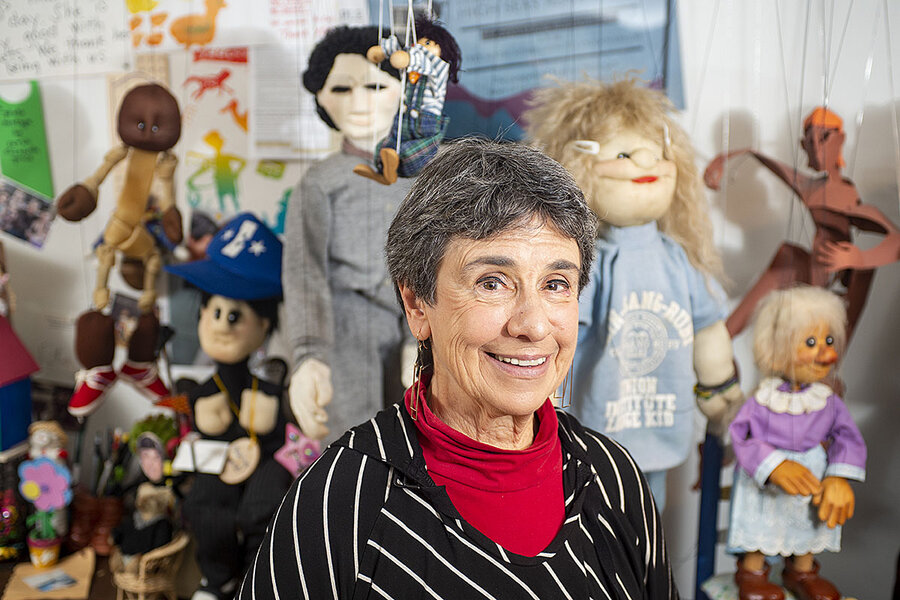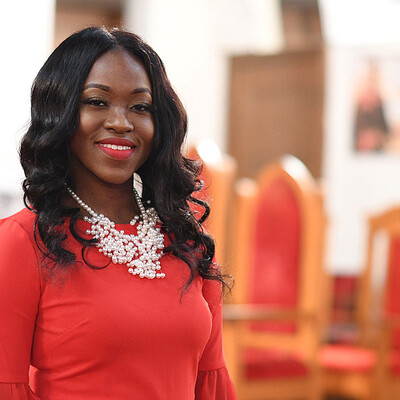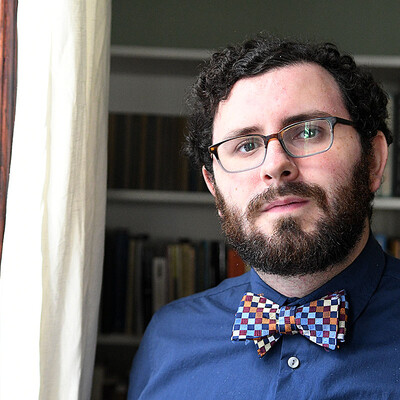Is saying ‘I’d kill for those shoes’ OK? One woman and Sixth Commandment.
Loading...
| Philadelphia
Marilyn Price’s favorite thing is puppeteering – using puppets to tell stories. She chooses stories, often classics like “The Little Engine That Could,” that show children how to make their own lives better.
In addition to being puppeteer for the Chicago Public Library for 40 years, Ms. Price is an author, educator, foundation head, networker, and all-around resource person to many. In everything she does, she sees herself as a “connector,” seeking out opportunities to engage in life. “People need to learn to live a good life,” she says.
Why We Wrote This
For Marilyn Price, the commandment “Thou shalt not kill” points to the importance of living a good life, and living it fully. Part 7 in a series looking at the Ten Commandments through modern lives.
Ms. Price shared her thoughts about the Sixth Commandment – “Thou shalt not kill” – as part of the Monitor’s series examining the ways ancient ideas like the Ten Commandments continue to matter in modern life.
“Teaching good choices is the closest we get to the Commandments these days,” Ms. Price says. Her aim is to show good choices in action – taking care of each other, showing loyalty, using time wisely, working together. But she doesn’t tell her listeners what to think about the stories she presents. “A good story is open enough that it allows you to put in your own thoughts,” she says.
Though she’s admittedly “well beyond retirement age,” there’s nary a rocking chair in sight for Marilyn Price.
Performer, author, educator, foundation head, networker, and all-around resource person to many, she keeps moving, her proudest distinction her 40 years as puppeteer to the 80-branch Chicago Public Library. This month alone, she is performing in a Utah children’s museum, performing again near Seattle, reading at a West Coast bookstore, and teaching California teachers about using the arts in education. This, after spending a weekend in New York City with her daughter and grandchildren, and before meeting up with her son’s family for Thanksgiving in Los Angeles.
In between, back home in Evanston, Illinois, she’s overseeing installation of puppet stages in each of the Chicago public libraries, and participating in end-of-life decision-making as part of her local hospital’s ethics committee. She describes herself as a “connector,” ever seeking out, learning about, and even eavesdropping (“peripheral listening,” she calls it) for opportunities to engage in life. She gobbles up interactions and lesson-illustrating experiences, absorbing stories and recounting them as she goes. “People need to learn to live a good life,” she says.
Why We Wrote This
For Marilyn Price, the commandment “Thou shalt not kill” points to the importance of living a good life, and living it fully. Part 7 in a series looking at the Ten Commandments through modern lives.
In the Judaism that underpins her decisions, the injunction against harming others also includes a moral imperative to make one’s own life matter. “I need to use it to make a difference,” Ms. Price says. “[Judaism] also commands you to judge carefully – not to judge the way other people live.”
She shared her thoughts about the Sixth Commandment – Thou shalt not kill (Exodus 20:13) – as part of the Monitor’s series exploring how people of different faiths use the Ten Commandments’ ancient principles in their modern lives. The word “kill” in Hebrew translates as, roughly, “murder.”
In town for meetings, Ms. Price chatted one rainy night recently at a favorite Philadelphia hotel that she considers to be a place of calm amid her travels.
Her favorite thing is puppeteering – using puppets to tell stories. She chooses stories, often classics, that show children how to make their own lives better. “The Little Engine That Could” is a perennial favorite, she says.
Ms. Price also runs a foundation helping teachers use the arts in school. So when she’s not talking “The Little Red Hen” with children, she’s talking “tri-braining,” multiple intelligences, and pedagogies with grown-ups.
A management consultant early in her career, she did her first puppet show at a holiday celebration at her synagogue, hiding behind an upright piano with a friend who, like her, was expecting her first baby. When, as a new mother, Ms. Price didn’t want to return to an office, she, along with her friend, pursued other synagogue gigs, and eventually she became the Chicago Public Library’s official puppeteer. She says she did “pieces no one wanted to do, in neighborhoods no one wanted to go into,” and before long, she got a break through Burr Tillstrom, of early TV’s legendary “Kukla, Fran and Ollie” show, for a children’s display as part of an exhibit about Pompeii at the Art Institute of Chicago. From there, she expanded into storytelling for adults – who tend to be a bit uncomfortable around the puppets, “at least at first,” she says.
Ms. Price, married 51 years, her two children raised, and now a grandmother, has a get-things-done approach that goes way back. She and her husband were raised in different movements of Judaism – she in the more liberal Reform tradition and he in Conservative – and as a compromise between the two traditions, the couple founded a Reconstructionist congregation in Evanston, which is still going strong.
“Teaching good choices is the closest we get to the Commandments these days,” Ms. Price says, overt religion being a non-starter in the mostly secular institutions where she makes her way. She taps sources as diverse as Hans Christian Andersen, Italian folklore, American classics, and the Old Testament of the Bible, whose stories are familiar to both Jews and Christians. Her aim is to show good choices in action – taking care of each other, showing loyalty, using time wisely, paying attention, remaining steadfast, working together. She doesn’t tell her listeners what to think about the stories. “A good story is open enough that it allows you to put in your own thoughts,” she says.
In moral decision-making, “one question people often find helpful to ask themselves is, ‘To what extent is your religious journey and your faith perspective affecting your ordinary life?’” says Rabbi David Teutsch, professor emeritus of contemporary Jewish civilization at the Reconstructionist Rabbinical College in Wyncote, Pennsylvania. Dr. Teutsch, a longtime friend and colleague of Ms. Price, says that, of all the laws and commands governing Jewish practice, “the most central commandment is ‘You shall love your neighbor as yourself.’ Marilyn is the embodiment of that kind of commitment. She has made a serious commitment to directly impacting for good the lives of people that she can reach.”
Ms. Price dislikes even the mention of violence. If you say, “I’d kill for those shoes,” you’ll likely rub her the wrong way. But using her Jewish tradition, as well as her own experience and reflections, she modifies and expands on the Ten Commandments to add dimension to her moral reasoning. When it comes to issues like self-defense, abortion, and end-of-life decisions, “there’s a lot of ‘ifs’ there,” she says, adding that she may have more ifs than others, a result of her tendency to overthink things.
“Everything I do is based on these precepts,” she says of her Jewish faith tradition. That tradition takes center stage in her current project, a children’s edition of “From Gratitude to Blessings and Back,” a book she co-wrote with Dr. Teutsch. The book wraps personal reflections and stories in with ancient Jewish blessings that highlight the presence of God in virtually every aspect of life, from eating and drinking to resolving conflict. She is especially fond of the awakening blessing: “Blessed are you, Eternal One our God ... who removes sleep from my eyes and slumber from my eyelids.”
Her favorite blessing, though, is prayed during times of gratitude, which she believes is the first step in passing good fortune forward:
“Blessed are you, Eternal One our God, the sovereign of all worlds whose name is Good and to whom it is good to give thanks.”
Part 1: The Commandments as a moral source code in modern life
Part 2: How does the First Commandment fit in today?
Part 3: ‘I have to have humility’: How Second Commandment helped man find freedom
Part 4: One woman embraces Third Commandment in feeding 1,600 at Thanksgiving
Part 5: ‘Remember the sabbath’: How one family lives the Fourth Commandment
Part 6: ‘Growing up is hard’: How Fifth Commandment guided a child during divorce
Part 7: Is saying ‘I’d kill for those shoes’ OK? One woman and Sixth Commandment.
Part 8: Is chastity old-fashioned? An NFL veteran’s take on Seventh Commandment.
Part 9: ‘Thou shalt not steal’: Even someone else’s joy, says one educator
Part 10: ‘Thou shalt not bear false witness’: Ninth Commandment goes to Princeton
Part 11: Jealousy at Ivy League level: How a law professor views Tenth Commandment




















